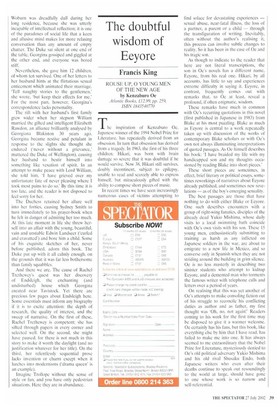The doubtful wisdom of Eeyore
Francis King
ROUSE UP, 0 YOUNG MEN OF THE NEW AGE by Kenzaburo Oe Mantic Books, 1.12.99, pp. 259, ISBN 1843540770 The inspiration of Kenzaburo 0e, Japanese winner of the 1994 Nobel Prize for Literature, has repeatedly derived from an obsession. In turn that obsession has derived from a tragedy. In 1963, the first of his three children, Hikari, was born with brain damage so severe that it was doubtful if he would survive. Now 38, Hikari still survives, doubly incontinent, subject to epilepsy, unable to read and scarcely able to express himself, but miraculously gifted with the ability to compose short pieces of music.
In recent times we have seen increasingly numerous cases of victims attempting to
find solace for devastating experiences — sexual abuse, near-fatal illness, the loss of a partner, a parent or a child — through the transfiguration of writing. Inevitably, often without the author's realising it, this process can involve subtle changes to reality. So it has been in the case of De and his tragic son.
As though to indicate to the reader that here are not literal transcriptions, the son in Oe's novels has a different name, Eeyore, from his real one. Hikari, by all accounts, has little to say and experiences extreme difficulty in saying it. Eeyore, in contrast, frequently comes out with remarks that, to Oe at least, reveal a profound, if often enigmatic, wisdom.
These remarks have much in common with Oe's recurring quotations in this novel (first published in Japanese in 1983) from Blake at his most puzzling. Blake as much as Eeyore is central to a work repeatedly taken up with discussion of the works of contemporary Blake scholars or with Oe's own not always illuminating interpretations of quoted passages. As Oe himself describes his book: 'I have braided my life with my handicapped son and my thoughts occasioned by reading Blake into short pieces.'
These short pieces are sometimes, in effect, brief literary or political essays, sometimes reworkings of narratives about Eeyore already published, and sometimes new revelations —as of the boy's emerging sexuality.
The best passages are those that have nothing to do with either Blake or Eeyore. One such describes encounters with a group of right-wing fanatics, disciples of the already dead Yukio Mishima, whose daily visits to a local swimming bath coincide with Oe's own visits with his son. These 15 young men, enthusiastically submitting to training as harsh as any inflicted on Japanese soldiers in the war, are about to emigrate to a new life in Mexico, and so converse only in Spanish when they are not striding around the building in grim silence. Oe is no less masterly in describing two sinister students who attempt to kidnap Eeyore, and a demented man who torments the famous writer with telephone calls and letters over a period of years.
On realising that this was yet another of Oe's attempts to make consoling fiction out of his struggle to reconcile his conflicting duties as author and as father, my first thought was 'Oh, no, not again!' Readers coming to his work for the first time may be disposed to give it a warmer welcome. Oe certainly has his fans, but this book, like everything else by him that I have read, has failed to make me into one. It has always seemed to me extraordinary that the Nobel Prize for Literature, mysteriously denied to Oe's old political adversary Yukio Mishima and his old rival Shusaku Endo, both Japanese writers who even after their deaths continue to speak out resoundingly to the world at large, should have gone to one whose work is so narrow and self-referential.
































































 Previous page
Previous page